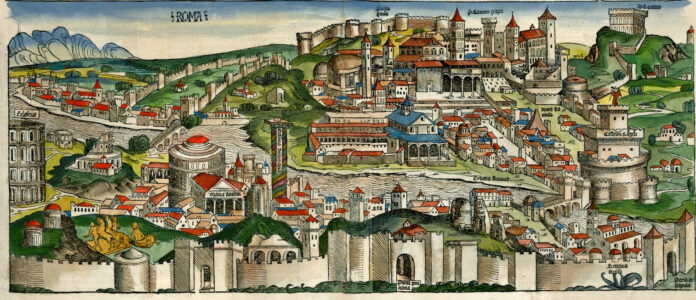
International Virtual Conference Organized by
Centro Studi Opera Omnia Luigi Boccherini, Lucca
IAM – Italian Institute for Applied Musicology
12-14 December 2025
To mark the 500th birthday of Giovanni Pierluigi da Palestrina (c.1525-1594), the Centro Studi Opera Omnia Luigi Boccherini and the Italian Institute for Applied Musicology are pleased to invite submissions of proposals for the virtual conference «“O felix Roma”: Palestrina and his Roman Contemporaries», to be held from 12 to 14 December 2025.
Even during his lifetime, Palestrina was widely regarded as one of the foremost musicians of the age. In a career spanning nearly half a century, he served as maestro di cappella in the major basilicas at Rome, including 27 years at the helm of the Cappella Giulia. His patrons included some of the most prominent prelates and nobility of his time, and he undertook freelance work for many of the city’s churches, oratories, seminaries, and confraternities. Arguably the most prolific composer of liturgical music in the early modern period, Palestrina’s output was vast: at least 104 masses, over 250 motets, over 140 madrigals, and hundreds of pieces of liturgical music have survived. His compositions were widely disseminated in manuscripts across the Italian peninsula and beyond; much of it reached an international audience through the Roman, Venetian, Flemish, and German printing houses of the period.
During his long career, Palestrina taught and influenced an entire generation of Roman composers, among whom Victoria, Soriano, Stabile, Dragoni, Nanino, and the Anerio brothers are but the most well-known today. In exploring the lives and works of Palestrina’s pupils and contemporaries, it is hoped this conference will contribute towards a more balanced understanding of Palestrina’s achievement and his role in the musical and cultural developments of his time.
Palestrina’s historical image and posthumous reputation resemble that of no other composer in the history of music. His masses and motets, especially, came to be regarded as the ars perfecta of liturgical polyphony in the decades following the Council of Trent — an idea that never entirely disappeared, but which was given renewed impetus in the 19th century by the Cecilian Movement. From the early 17th century, carefully selected aspects of his music were adopted by Italian, German, and Spanish theorists and used to codify the strict style of diatonic counterpoint known as the stile antico, versions of which continue to be used as pedagogical models today. While the notion of ‘Palestrina-style’ counterpoint has guaranteed the composer’s place in history textbooks, it has obscured both the range and the quality of his output, and unfairly characterised him as a conservative, even reactionary, figure.
Palestrina and his music were the subjects of groundbreaking, anti-romantic investigations in the 19th and 20th centuries, but scholarly interest has waned significantly in recent decades and, as Gustave Reese put it, «the more recent view has replaced overevaluation with underevaluation» (Music in the Renaissance, 1954, p. 459). Consequently, Palestrina and his music have not yet fully benefited from the advances of modern scholarship, the new research methodologies, or the bibliographic tools of the digital age. Several areas of Palestrina’s life and work remain unknown or under-researched, while others are ripe for reappraisal.
The conference is open to musicologists, historians, performers, and all scholars with an interest in the music and culture of early modern Rome. We welcome papers on a wide range of topics, encompassing music and culture in all its forms, including, but not restricted to:
- new evidence of, insights into, and interpretations of the biographies and music of Palestrina, his pupils, and his contemporaries;
- music printing and publishing in Rome;
- art, architecture, and acoustics in Rome;
- institutional patronage and the production of music in the churches, colleges, seminaries, confraternities, and religious orders of Rome;
- patronage of music and musicians by prelates, patricians, and the business classes of Rome;
- the Roman diaspora in Europe and the New World;
- performance practices and the soundscape of the city of Rome in the 16th century, including popular devotional music, street music, and domestic music-making;
- the reception of music by the ‘Roman school’ and the influence of the stile antico in music from the 17th to 21st centuries;
- the use of Palestrina’s music in the context of the liturgical movements of the 19th and 20th centuries, and in the early music revival.
Programme committee:
- Thomas Neal (Oxford, UK)
- Roberto Illiano (Centro Studi Opera Omnia Luigi Boccherini)
- Fulvia Morabito (Centro Studi Opera Omnia Luigi Boccherini)
- Massimiliano Sala (Centro Studi Opera Omnia Luigi Boccherini)
- Galliano Ciliberti (Conservatorio ‘Nino Rota’ di Monopoli)
- Noel O’Regan (Edinburgh College of Art)
Keynote speakers:
- Jane Bernstein (Tufts University, Medford, MA)
- Richard Sherr (Smith College, Northampton, MA)
The official languages of the conference are English, French, Italian and Spanish. Papers selected at the conference will be published in a miscellaneous volume.
Papers are limited to 20 minutes in length, allowing time for questions and discussion. Please submit an abstract of no more than 500 words. We also welcome proposals for pre-recorded recitals or lecture-recitals of 20-30 minutes in length.
All proposals should be submitted by email no later than ***27 April 2025*** to <conferences@luigiboccherini.org>. Alongside your proposal, please include your name, contact details (postal address, email, and telephone number), and your institutional affiliation (if applicable).
The committee will make its final decision on the abstracts by May 2025, and contributors will be informed immediately thereafter. Further information about the programme and registration will be announced after that date.
For any additional information, please contact:
Dr. Massimiliano Sala
conferences@luigiboccherini.org
www.luigiboccherini.org








